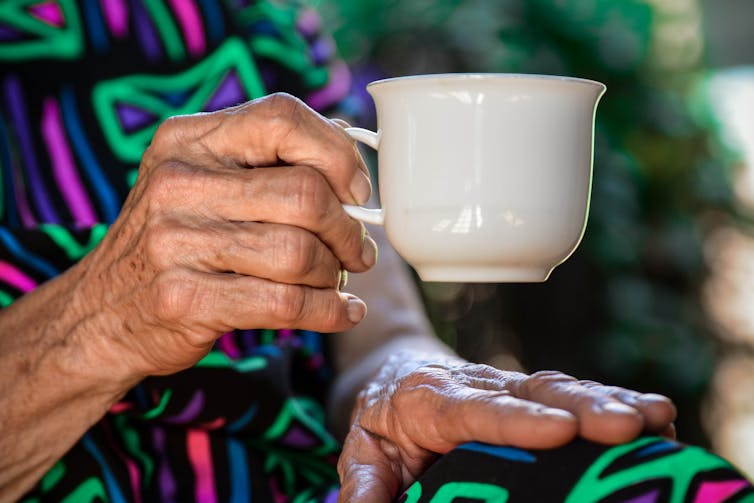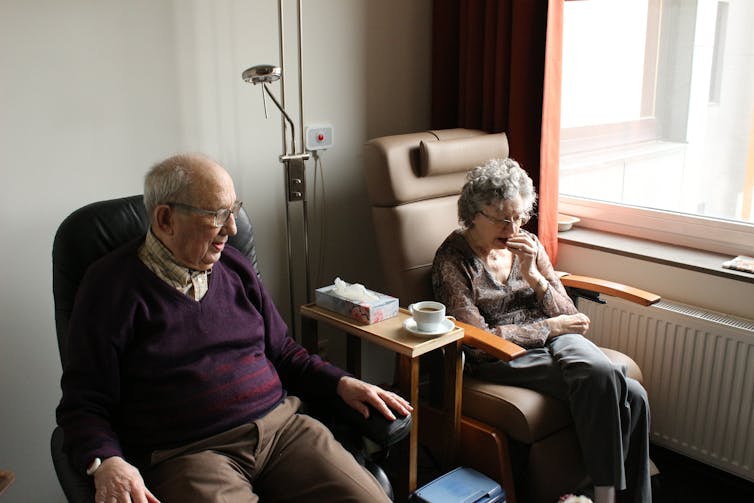
from www.shutterstock.com
Helen Rawson, Deakin University
This week, the aged care royal commission looks at diversity in aged care, an issue becoming increasingly relevant to both residents and the staff who care for them.
Diversity includes gender, sexual orientation, religion and social background. The issue is important because if we aim to offer older people and families choice and control in aged care, we must meet the diverse needs of all older people.
Read more:
Our culture affects the way we look after ourselves. It should shape the health care we receive, too
Australia’s rich diversity is reflected in its older population. In 2016, more than one-third (37%) of Australians aged 65 and over were born overseas and one-fifth (20%) were born in a non-English speaking country.
These figures have increased continually since 1981, when one-quarter (25%) of older people were born overseas.
Diversity within diversity: culture and language
Culture is important for every person. It indicates a way of life based on customs, beliefs, language and experiences shared with family and a wider community or group.
According to the Federation of Ethnic Communities’ Councils of Australia, many people from culturally and linguistically diverse backgrounds don’t want to move to a nursing home. This is for a number of reasons.
They may not want to be away from family and community, they might speak a different language to staff and other residents, and homes may not understand or meet their individual cultural needs.
Our previous research showed living in an aged care facility could make some older people feel disempowered. Language and cultural diversity can further add to that disempowerment. For the older people we studied, communication, companionship, and staff knowing them as individuals was very important.
Read more:
Between health and faith: managing type 2 diabetes during Ramadan
Language is particularly important for older people’s physical health and well-being. Many culturally and linguistically diverse older people say they speak English well. However, with age and cognitive decline, they may lose the ability to communicate in English and revert to their first language.
And as more than half of nursing home residents have dementia, with the associated deterioration in language and cognition, communication can be more difficult still.

from www.shutterstock.com
Being aware of their peer’s culture and language can help residents build relationships with each other, family and staff.
Different cultural expectations and language barriers can create misunderstanding and resident and family dissatisfaction. This can affect residents’ care and quality of life.
Read more:
How to check if your mum or dad’s nursing home is up to scratch
How can we support appropriate care?
Aged care needs to be responsive, inclusive and sensitive to a person’s culture, language and spiritual needs. So it is important for nursing homes to understand those needs.
For those who are culturally diverse, government-funded support and culturally specific nursing homes can help. These include services for Greek, Italian, Dutch, Jewish and Chinese older people, reflecting post-war migration.
However, organisations like these cannot meet everyone’s needs. So all residents need care that respects cultural and social differences, works with older people and family, and supports choice.
Read more:
What do Aboriginal Australians want from their aged care system? Community connection is number one
What might appropriate care look like?
Staff need ongoing cultural competence training to deliver appropriate and supportive care.
Staff cannot know everything about the many cultural and language groups in Australia. They can, however, practise in way that is culturally appropriate, by:
-
never making assumptions about someone’s culture, heritage, language or individual needs. No two people are the same, even if they are from the same culture and language background
-
talking to the resident with an interpreter, if needed
-
learning what is important to the resident. For example, staff could ask family members or close friends to bring in photos or mementos important to the older person
-
talking with family of residents who are unable to communicate in English to make a list of key words or phrases for staff. This could include how to say “hello”, or how to ask “are you comfortable?”, or “are you in pain?”
-
making sure the older person isn’t isolated in the nursing home. This could involve working with the local community of the person’s culture, and asking for volunteers who could come and visit the older person.

Nadya Chetah/Shutterstock
Appropriate and respectful aged care is a human right
Culture and language diversity in aged care is a fundamental human right. Embedding diversity in all aspects of aged care is also recognised by government, and in how the quality of aged care is assessed.
New aged care quality standards, which came into effect this July, include being treated with dignity and respect, with identity, culture and diversity valued, and all residents able to make informed choices about the care and services they receive.
If the outcomes of this royal commission are to benefit Australians now and especially in the future, older people from culturally and linguistically diverse backgrounds must not be an afterthought in the aged care discussion. They must be part of the planning.![]()
Helen Rawson, Senior Research Fellow, Deakin University
This article is republished from The Conversation under a Creative Commons license. Read the original article.










